American Bonsai at the NC Arboretum
+95
kingsnake
Tom
MKBonsai
BrianS
manumidam
Chris Cochrane
Intricate Simplicity
chench53
KyleT
Maros Belan
DjTommy
Bolero
Gonetopot
Rick36
M. Frary
Van
Toshiro
fiona
Precarious
drbuzzbee
geo
LanceMac10
MichaelS
kimo
Chellis
Leo Schordje
FrankP999
dick benbow
BrianG
crust
TN Jim
Seth Ellwood
Wander
peterkang
Judgie
Kevin S - Wisco Bonsai
Vance Wood
JMcCoy
brett2013
GerhardGerber
lordy
Eric Group
my nellie
steveb
Jaybird
Todd Ellis
jgeanangel
Daygan
AlainK
Richard S
Randy_Davis
Robert J. Baran
David Brunner
William N. Valavanis
Jkd2572
Dale Cochoy
Jesse McMahon
prestontolbert
yamasuri
bingregory
Stephen Krall
DougB
Ashiod
JADunnagan
sayotefries
JudyB
Dan W.
Khaimraj Seepersad
DuncanJH
Dave Murphy
monte
MikeG
augustine
Russell Coker
Kev Bailey
lennard
BigDave
Marty Weiser
Smithy
coh
tmmason10
dorothy7774
gman
Dave Leppo
hometeamrocker
bwaynef
Billy M. Rhodes
Walter Pall
Sam Ogranaja
JimLewis
MartinSweeney
bonsaisr
Auballagh
John Quinn
Arthur Joura
99 posters
Page 16 of 40
Page 16 of 40 •  1 ... 9 ... 15, 16, 17 ... 28 ... 40
1 ... 9 ... 15, 16, 17 ... 28 ... 40 
 Re: American Bonsai at the NC Arboretum
Re: American Bonsai at the NC Arboretum
dick benbow wrote: Arthur comes to the Pacific northwest in March. Seattle and Portland area clubs will have an opportunity to see and appreciate his artistry. I'm really into local trees,
so birds of a feather.... will happily get together.
Sweet!!! You'll like him. He has great presentations. His favorite music is rap with artists like DMX, NAS, Jay-Z, pretty much anyone from New York. You should play Nas's "If I ruled the world" as he's being introduced
By the way, for full disclosure just in case you get ideas, I'm completely joking about the rap music

Sam Ogranaja- Member
 Re: American Bonsai at the NC Arboretum
Re: American Bonsai at the NC Arboretum
though he was fortunate enough to have seen the clash...
twice.
sorry arthur, but now we are even-steven in the outing dept

twice.
sorry arthur, but now we are even-steven in the outing dept

Kevin S - Wisco Bonsai- Member
 Heart Full of Hollow
Heart Full of Hollow
Many thanks to those who have posted replies in the last couple of weeks, and particularly to my buddy John G. for making and posting the hornbeam video. As Stephen, Richard, Kevin, Doug and Sam all testified, John G. continues to make an important contribution to the bonsai community with his YouTube channel. It provides straightforward and practical information, gleaned from first-hand experience. As I see it, John's sole purpose is to freely share what he knows with others who have the interest, so his videos are vehicles of communication and not a chance for him to make a name for himself or show off slick production values. Just as John is not in the "business" of making videos, he is not in the "business" of doing bonsai. Which is to say he is not a paid professional, although he has talent enough to be one. Like most of the people who read this forum, he does bonsai purely for the enjoyment of it, but he has attained a level of skill that not so many non-professionals do.
In answer to the comment by Dick B. - I am looking forward to my upcoming visit to the Seattle area and will appreciate meeting you! This is my first foray into west coast bonsai and I am hoping a few people will show up for it. It feels a bit like traveling to a foreign country, but I will be hosted by Dan and Diane Robinson and I know they will make me feel at home.
In my previous post I was discussing the importance of the ability of woody plants, and other things, to recover from calamity. I closed with a photograph of a living tree I came across here in the mountains of North Carolina, that looked like it might have been blasted with an explosive charge a long time ago and somehow survived and recovered. (Actually, to me it looks like some alien in the act of giving birth, but that is a purely subjective perspective.) My friend Steve, in his reply, wondered how it came to look that way, and I cannot offer any likely explanation. I know of another tree, however, that also bears the marks of having lived through a traumatic event, and in this case I can explain it. As it happens, this tree is a Red Maple (Acer rubrum), a species in which Steve expressed interest in an earlier post, and it is a bonsai-in-training.
To begin with, here is what it looks like today:
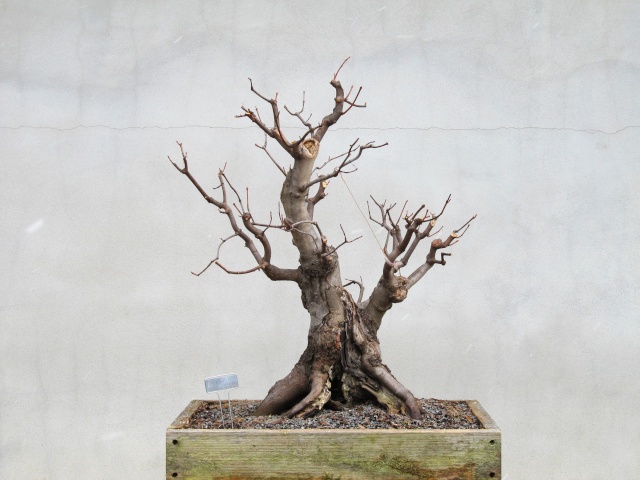
This specimen stands 28in (71.1cm) in height, and has a diameter of 8in (20.3cm) just above the surface roots.
Sometime back in the early 2000's this red maple was languishing in the Arboretum's container nursery, intended for landscape use but somehow never finding a home. It became pot-bound in its big plastic nursery can, and because it was about 6ft (1.8m) tall it was prone to falling down whenever the wind blew. Eventually it was viewed as a nuisance and scheduled for de-accessioning. The tree had some size in the trunk, and a well formed base with good surface roots, however, and so it caught my eye. I saved it from the compost pile, cut it down to its lowest branch and transferred it from the nursery to the bonsai area, where it was then neglected a few more years but was no longer prone to falling over. Finally, out of sympathy for its still pot-bound condition and concern at how slowly it was producing callous material to cover the gaping wound left by the trunk chop, I put the maple in a grow bed. Here is the first image I have of this tree, made late in 2008 after it had been in the ground a year or 2:
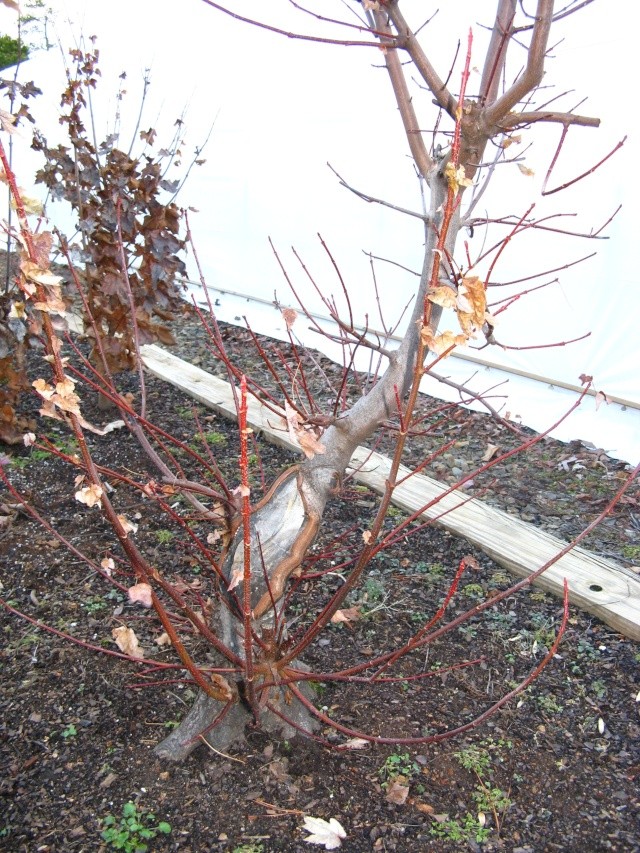
At this point I decided I might not live long enough to see the big wound completely cover. Feeling experimental, or perhaps sadistic, I chopped the tree again. Here is what it looked like in April of '09, the nadir of this maple's existence:

Poor tree! But do not despair - this is a red maple we are talking about, and if it was chopped right down to the ground it would likely grow again from the roots. I let it have 2 seasons of more or less undisturbed growth, which produced this result in February of 2011:
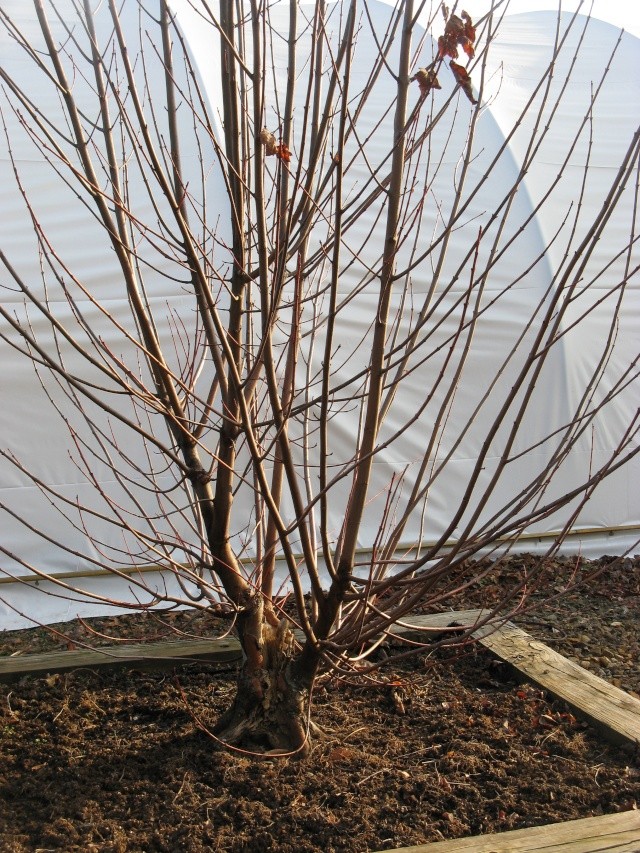
Obviously, the tree survived the brutality of being twice chopped, but not without paying a price. Closing in on the above photograph, we can see that the resulting wound proved too large to cover over and the exposed wood decayed:
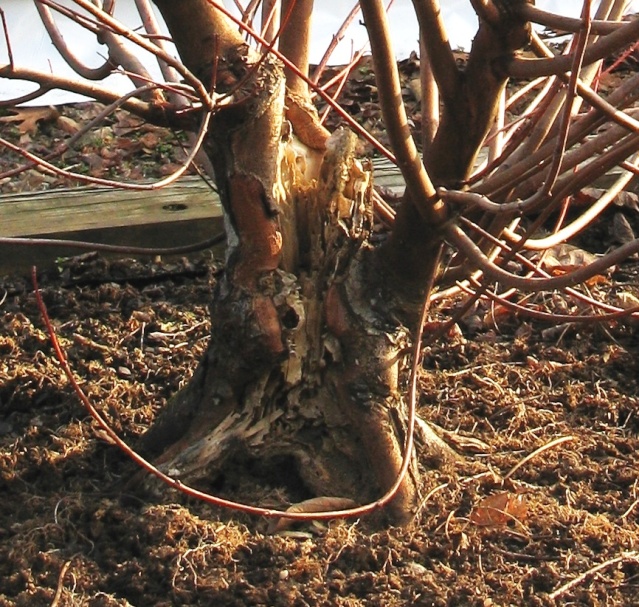
In addition to the decay, the doughty wood was attacked by termites that chewed vertical channels in it right down to the soil and then some. This prompted me to lift the tree out of the earth and plant it in a very large grow box, where I could eradicate the termites and make certain they did not return. I cleaned up the unstable dead wood but left as much of the termite's carving as I could. Here is what the result looked like in April of 2011:
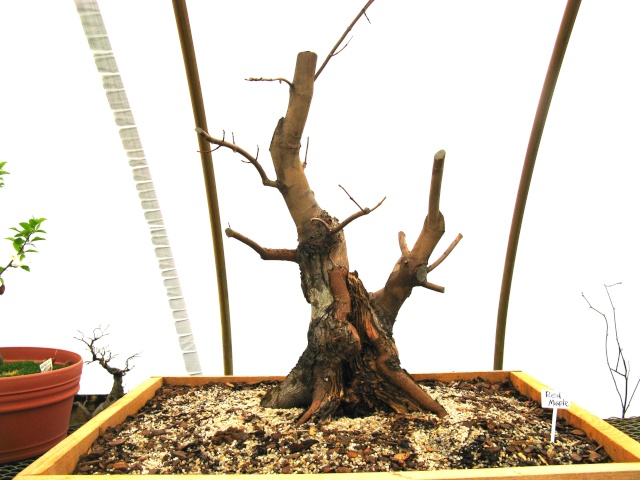
In order to encourage the plant as it made the transition from growing in the earth to once more growing in a container, I did not prune it that growing season. Here is what it looked like nearly a year later, in March of 2012:
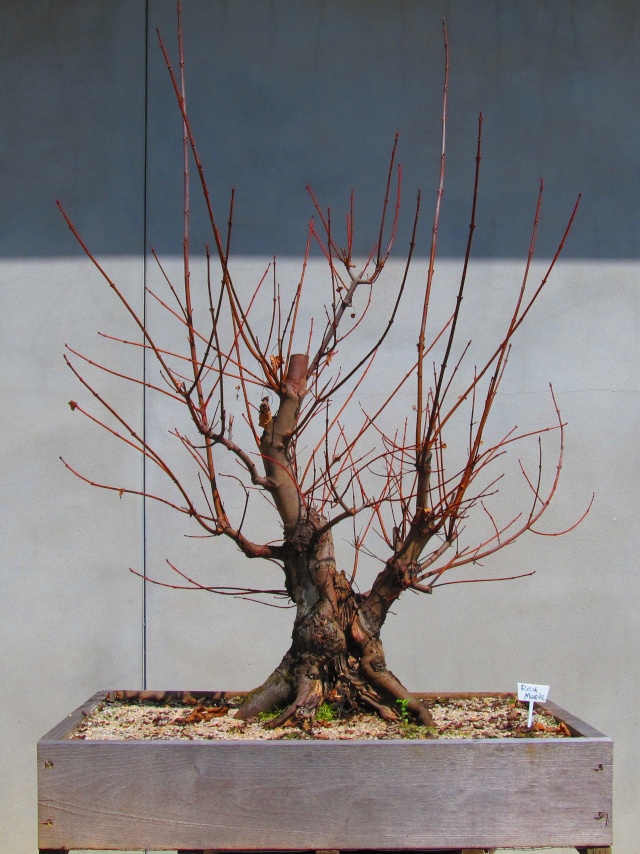
I spent a few hours sorting through all the new growth, cutting much of it away but retaining all branching I thought might serve my purpose. I also devoted a little time to further protecting the core of the tree, as red maple wood does not hold up particularly well to outdoor exposure. I burnished it with a small torch, brushed it clean and then treated it with wood hardener. This picture was made the same day as the previous one:
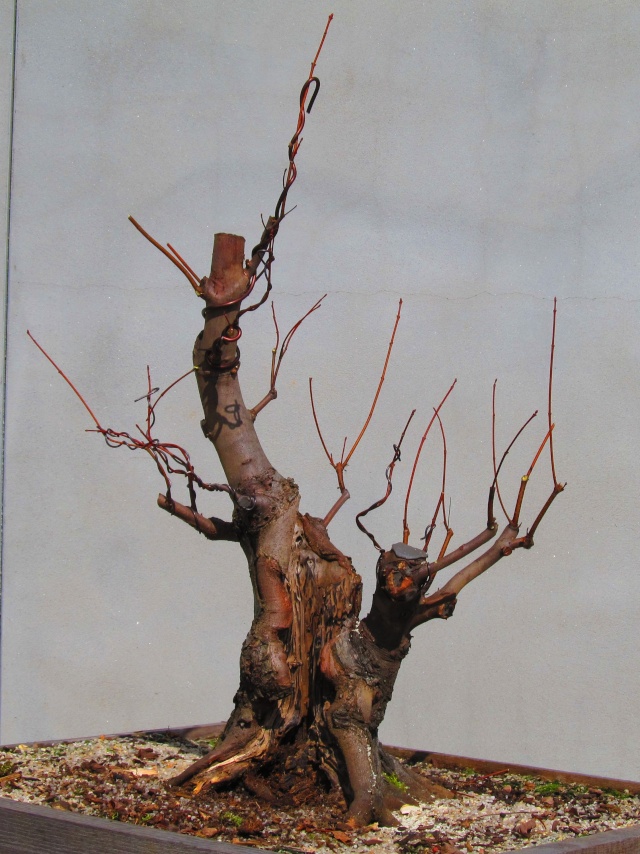
Among several traits that make red maple a desirable candidate for bonsai use, its propensity for outstanding autumn color should not be overlooked. This image was made in November of 2013, but this specimen produces a similar foliage display every year:
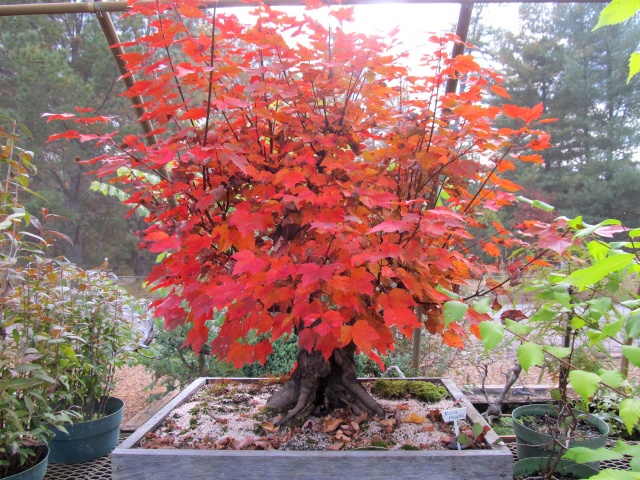
Later that same month, once the leaves dropped, the tree had this appearance:
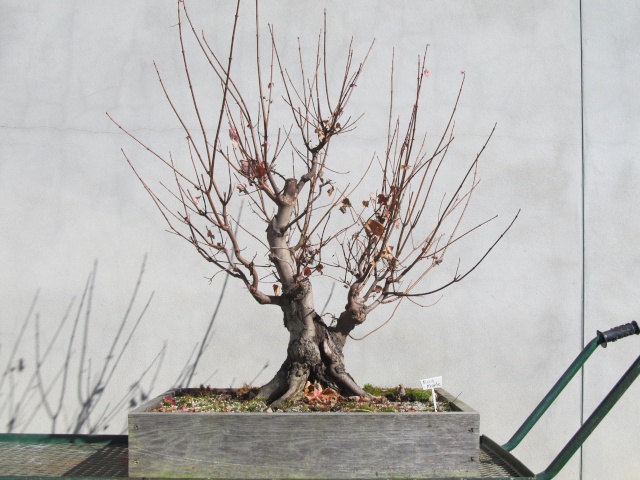
At this time I decided to transplant it into a smaller grow box, in preparation for eventually getting it into an appropriately sized bonsai container. Just as we carefully work the top of a tree in development, incrementally bringing it into bonsai form, so too we should be simultaneously working the root system step by step. When I transplanted this maple from the ground into a grow box in 2011, I decided to minimize the trauma by not bare-rooting it just yet. But now I felt it was ready. Here is the naked tree, showing a fibrous root system in excellent condition:
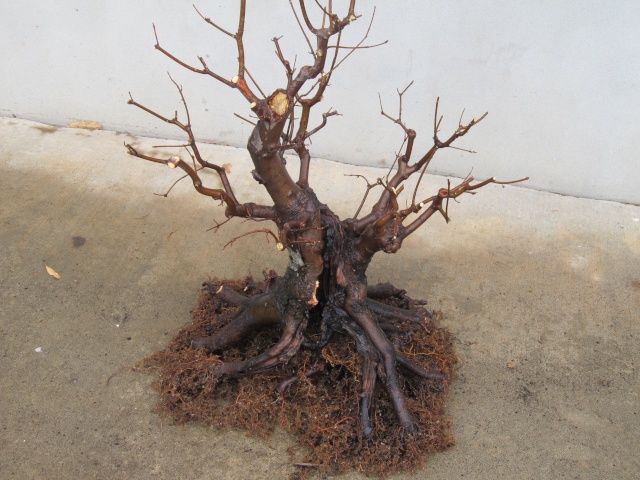
Please note that this bare-root transplanting was done in the month of November. The large number of trees I am caring for dictates that I must do some of my repotting at times that are less than optimal. I have experienced little difficulty with having to do this, and no problem at all with doing it to red maples. Asheville is in zone 7a (historically we were 6b, but that was recently changed to reflect the effects of climate change) so we do get cold. Not Minnesota cold, but teens and single digit and sometimes even below zero Fahrenheit cold. The winter of '13 - '14 was particularly cold, and this maple went through it after being bare-root repotted in mid-November. The only protection from the elements it received was being located in an unheated hoop house that was covered with white polypropylene. It was up on a bench, too, not set down on the ground. I am not by any means recommending that other bonsai growers should do this; as previously indicated, I do it out of necessity. The point is, red maples are tough trees.
Here we see the tree at the conclusion of the November, 2013 repotting session:

I have no images of this specimen to show from 2014. It grew strongly, however, and I pruned it just once, about June, using the patented Walter Pall Hedge-cutting Method. I recently did its annual intensive shaping, but, remarkably, I failed to take "before" pictures. I did do a round of "after" pictures, however. Here they are, with the final shot being the primary view:
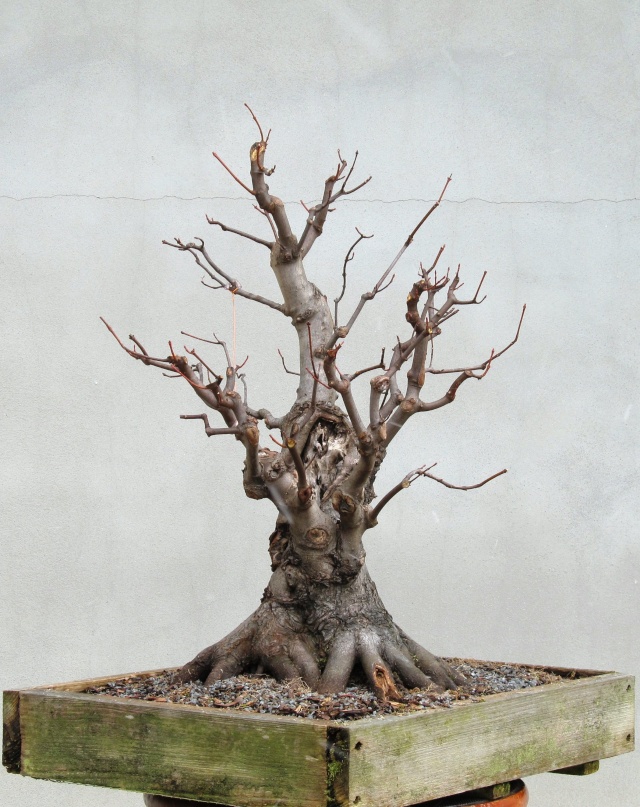


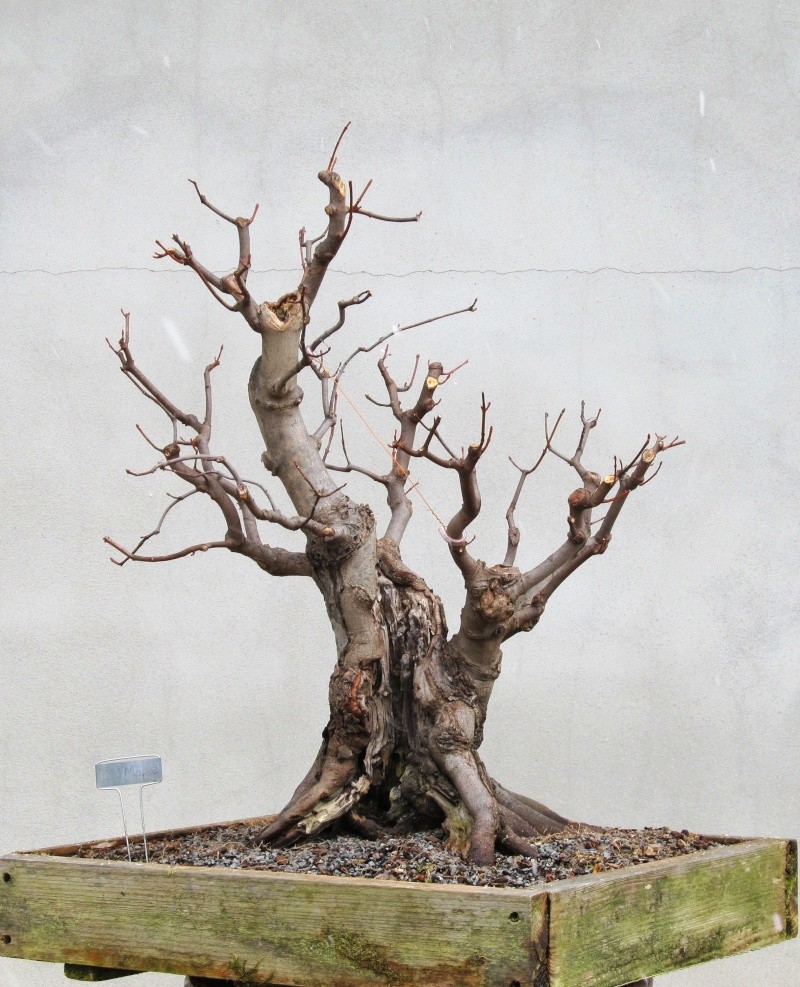
Last September at the 4th US National Bonsai Exhibition I was pleased to find bonsai potter Sara Rayner among the vendors. I purchased this container from her:

When she was wrapping it up, she said, "So, you must have a big maple to put in this?"
I answered, "Oh yes, I think I have just the one!"
In answer to the comment by Dick B. - I am looking forward to my upcoming visit to the Seattle area and will appreciate meeting you! This is my first foray into west coast bonsai and I am hoping a few people will show up for it. It feels a bit like traveling to a foreign country, but I will be hosted by Dan and Diane Robinson and I know they will make me feel at home.
In my previous post I was discussing the importance of the ability of woody plants, and other things, to recover from calamity. I closed with a photograph of a living tree I came across here in the mountains of North Carolina, that looked like it might have been blasted with an explosive charge a long time ago and somehow survived and recovered. (Actually, to me it looks like some alien in the act of giving birth, but that is a purely subjective perspective.) My friend Steve, in his reply, wondered how it came to look that way, and I cannot offer any likely explanation. I know of another tree, however, that also bears the marks of having lived through a traumatic event, and in this case I can explain it. As it happens, this tree is a Red Maple (Acer rubrum), a species in which Steve expressed interest in an earlier post, and it is a bonsai-in-training.
To begin with, here is what it looks like today:

This specimen stands 28in (71.1cm) in height, and has a diameter of 8in (20.3cm) just above the surface roots.
Sometime back in the early 2000's this red maple was languishing in the Arboretum's container nursery, intended for landscape use but somehow never finding a home. It became pot-bound in its big plastic nursery can, and because it was about 6ft (1.8m) tall it was prone to falling down whenever the wind blew. Eventually it was viewed as a nuisance and scheduled for de-accessioning. The tree had some size in the trunk, and a well formed base with good surface roots, however, and so it caught my eye. I saved it from the compost pile, cut it down to its lowest branch and transferred it from the nursery to the bonsai area, where it was then neglected a few more years but was no longer prone to falling over. Finally, out of sympathy for its still pot-bound condition and concern at how slowly it was producing callous material to cover the gaping wound left by the trunk chop, I put the maple in a grow bed. Here is the first image I have of this tree, made late in 2008 after it had been in the ground a year or 2:

At this point I decided I might not live long enough to see the big wound completely cover. Feeling experimental, or perhaps sadistic, I chopped the tree again. Here is what it looked like in April of '09, the nadir of this maple's existence:

Poor tree! But do not despair - this is a red maple we are talking about, and if it was chopped right down to the ground it would likely grow again from the roots. I let it have 2 seasons of more or less undisturbed growth, which produced this result in February of 2011:

Obviously, the tree survived the brutality of being twice chopped, but not without paying a price. Closing in on the above photograph, we can see that the resulting wound proved too large to cover over and the exposed wood decayed:

In addition to the decay, the doughty wood was attacked by termites that chewed vertical channels in it right down to the soil and then some. This prompted me to lift the tree out of the earth and plant it in a very large grow box, where I could eradicate the termites and make certain they did not return. I cleaned up the unstable dead wood but left as much of the termite's carving as I could. Here is what the result looked like in April of 2011:

In order to encourage the plant as it made the transition from growing in the earth to once more growing in a container, I did not prune it that growing season. Here is what it looked like nearly a year later, in March of 2012:

I spent a few hours sorting through all the new growth, cutting much of it away but retaining all branching I thought might serve my purpose. I also devoted a little time to further protecting the core of the tree, as red maple wood does not hold up particularly well to outdoor exposure. I burnished it with a small torch, brushed it clean and then treated it with wood hardener. This picture was made the same day as the previous one:

Among several traits that make red maple a desirable candidate for bonsai use, its propensity for outstanding autumn color should not be overlooked. This image was made in November of 2013, but this specimen produces a similar foliage display every year:

Later that same month, once the leaves dropped, the tree had this appearance:

At this time I decided to transplant it into a smaller grow box, in preparation for eventually getting it into an appropriately sized bonsai container. Just as we carefully work the top of a tree in development, incrementally bringing it into bonsai form, so too we should be simultaneously working the root system step by step. When I transplanted this maple from the ground into a grow box in 2011, I decided to minimize the trauma by not bare-rooting it just yet. But now I felt it was ready. Here is the naked tree, showing a fibrous root system in excellent condition:

Please note that this bare-root transplanting was done in the month of November. The large number of trees I am caring for dictates that I must do some of my repotting at times that are less than optimal. I have experienced little difficulty with having to do this, and no problem at all with doing it to red maples. Asheville is in zone 7a (historically we were 6b, but that was recently changed to reflect the effects of climate change) so we do get cold. Not Minnesota cold, but teens and single digit and sometimes even below zero Fahrenheit cold. The winter of '13 - '14 was particularly cold, and this maple went through it after being bare-root repotted in mid-November. The only protection from the elements it received was being located in an unheated hoop house that was covered with white polypropylene. It was up on a bench, too, not set down on the ground. I am not by any means recommending that other bonsai growers should do this; as previously indicated, I do it out of necessity. The point is, red maples are tough trees.
Here we see the tree at the conclusion of the November, 2013 repotting session:

I have no images of this specimen to show from 2014. It grew strongly, however, and I pruned it just once, about June, using the patented Walter Pall Hedge-cutting Method. I recently did its annual intensive shaping, but, remarkably, I failed to take "before" pictures. I did do a round of "after" pictures, however. Here they are, with the final shot being the primary view:




Last September at the 4th US National Bonsai Exhibition I was pleased to find bonsai potter Sara Rayner among the vendors. I purchased this container from her:

When she was wrapping it up, she said, "So, you must have a big maple to put in this?"
I answered, "Oh yes, I think I have just the one!"
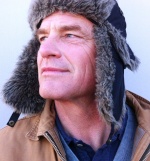
Arthur Joura- Member
 Re: American Bonsai at the NC Arboretum
Re: American Bonsai at the NC Arboretum
thank-you for sharing your maple and pot. Stunning......
If it wasn't for folks like john, who genuinely care about helping others, american bonsai would be furthur behind and having a longer way to go to catchup.
We're fortunate here in the northwest to have the likes of Dan Robinson and David De Groot with the same attitude.
If it wasn't for folks like john, who genuinely care about helping others, american bonsai would be furthur behind and having a longer way to go to catchup.
We're fortunate here in the northwest to have the likes of Dan Robinson and David De Groot with the same attitude.
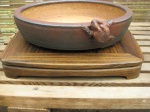
dick benbow- Member
 Re: American Bonsai at the NC Arboretum
Re: American Bonsai at the NC Arboretum
Wow Arthur.
I mean, really. From such formerly 'disreputable', locally grown/available material, as Acer rubrum..... we have this?
It's all about the root base, man. Or, shall I simply say: "OMG".
Translation?
Oh. My. God.
Really.
That Nebari *ahem* 'Root Base' is just about, World Class.
Thanks as always, Arthur. Your posts are as always, informative. Educational.
Even,
Entertaining.
I mean, really. From such formerly 'disreputable', locally grown/available material, as Acer rubrum..... we have this?
It's all about the root base, man. Or, shall I simply say: "OMG".
Translation?
Oh. My. God.
Really.
That Nebari *ahem* 'Root Base' is just about, World Class.
Thanks as always, Arthur. Your posts are as always, informative. Educational.
Even,
Entertaining.
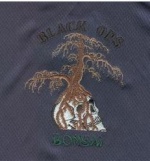
Auballagh- Member
 Re: American Bonsai at the NC Arboretum
Re: American Bonsai at the NC Arboretum
A wonderful posting, Arthur. Way back in 1978 Jerry Stowell extolled the value of A. rubrum as an "American" bonsai. I'd tried to follow him on many occasions, finally giving up because I favor trees that are small, and this species cries for existence as a larger bonsai. Your work here shows how right Jerry was.
Thanks.
Thanks.

JimLewis- Member
 Re: American Bonsai at the NC Arboretum
Re: American Bonsai at the NC Arboretum
HI Arthur,
Great post on such an under-used, but very good bonsai species. One of the things I think this post shows is that how little time it takes to get an Acer rubrum in to a really nice base structure for bonsai. In just a few season this species can really put on a lot of wood when given a good growing situation, This is also similarly true with Trident maples, verses having to wait decades for pines species for instance. I personally like it when scaring occurs on deciduous material. Nothing say "old" to me like a tree that has huge wounds, or a massive base with surface roots. I have seen it so many times in nature. Nature may not always be pretty, but it is always beautiful.
Steve
P.S. Love the Alien reference in your post....
Great post on such an under-used, but very good bonsai species. One of the things I think this post shows is that how little time it takes to get an Acer rubrum in to a really nice base structure for bonsai. In just a few season this species can really put on a lot of wood when given a good growing situation, This is also similarly true with Trident maples, verses having to wait decades for pines species for instance. I personally like it when scaring occurs on deciduous material. Nothing say "old" to me like a tree that has huge wounds, or a massive base with surface roots. I have seen it so many times in nature. Nature may not always be pretty, but it is always beautiful.
Steve
P.S. Love the Alien reference in your post....

Stephen Krall- Member
 Re: American Bonsai at the NC Arboretum
Re: American Bonsai at the NC Arboretum
Awesome Acer! This is well on it's way to being a very nice tree/bonsai. Great work Arthur!
Thank you for keeping such great records and progression photo's; They add tremendously to your already valuable information and insight.
Thank you for keeping such great records and progression photo's; They add tremendously to your already valuable information and insight.

Dan W.- Member
 Re: American Bonsai at the NC Arboretum
Re: American Bonsai at the NC Arboretum
I'm looking forward to seeing the tree potted. Do you plan to do it this spring?

Dan W.- Member
 Re: American Bonsai at the NC Arboretum
Re: American Bonsai at the NC Arboretum
Arthur, you've posted a lot of great trees on this thread but I genuinely think that this could be your best yet!
Already an incredibly powerful image even at this early stage.
With your talent and such a great foundation things can only get better.
Awesome.
Regards
Richard
Already an incredibly powerful image even at this early stage.
With your talent and such a great foundation things can only get better.
Awesome.
Regards
Richard

Richard S- Member
 Re: American Bonsai at the NC Arboretum
Re: American Bonsai at the NC Arboretum
Arthur,
Thank you for posting this great teaching example. Really informative, and great photographs.
By the way, I see you added a workshop at the Atlanta Bonsai Club this year. I couldn't attend your session in Atlanta this time- I hope you make our club in Atlanta a regular stop in the future.
Frank
Thank you for posting this great teaching example. Really informative, and great photographs.
By the way, I see you added a workshop at the Atlanta Bonsai Club this year. I couldn't attend your session in Atlanta this time- I hope you make our club in Atlanta a regular stop in the future.
Frank
FrankP999- Member
 Re: American Bonsai at the NC Arboretum
Re: American Bonsai at the NC Arboretum
That is a beautiful tree, Arthur! And that fall color, even without a lot of refined branch ramification, is also breath-taking. I can't wait to see how it develops under your further care.
Daygan- Member
 Re: American Bonsai at the NC Arboretum
Re: American Bonsai at the NC Arboretum
Outstanding Arthur, Man I'm so excited to see all the results from the years of your hard works and visions for the Arboretum. October can't get here fast enough! I've collected over a half dozen out the swamps in the past month and all are pushing buds and seeing this tree really makes me anxious for the future. Another great great job!, Brian

BrianG- Member
 Re: American Bonsai at the NC Arboretum
Re: American Bonsai at the NC Arboretum
Can't add much to whats already been said, but I like this tree very much. Thank you for sharing it's progression.
JudyB- Member
 Repotting a Maple Group Planting
Repotting a Maple Group Planting
Thank you to Dick, Bill, Kevin, Jim, Steve, Dan, Richard, Frank, Daygan, Brian and Judy! I sincerely appreciate that you take the time to read these posts and share your thoughts. That your comments are so generously positive is icing on the cake!
A funny thing happened this week - I went to transplant the tree from the last post into its new Sara Rayner container and came to find that the pot is too small. Now, that pot is 17in (43.1cm) in diameter, interior dimension, but it lacked about 2in (5cm) for me to even wedge the maple in it. The ghost of Roy Scheider was looking over my shoulder saying "You're gonna need a bigger pot!". So, the maple was root pruned and put back in the grow box for another year.
Today's post features a different maple species - Acer ginnala. Amur maple is native to northeastern Asia so it is extremely cold-hardy. In the US amur maples tend to be favored by people who live in colder regions, where tridents do not fare so well. Here in western North Carolina amur maple is one of the species I feel comfortable leaving out, fully exposed, all winter. Here is an image of the one amur maple bonsai in the NC Arboretum collection, a group planting, enjoying a bit of weather that must harken it's genetic memory back to the days in the old country:
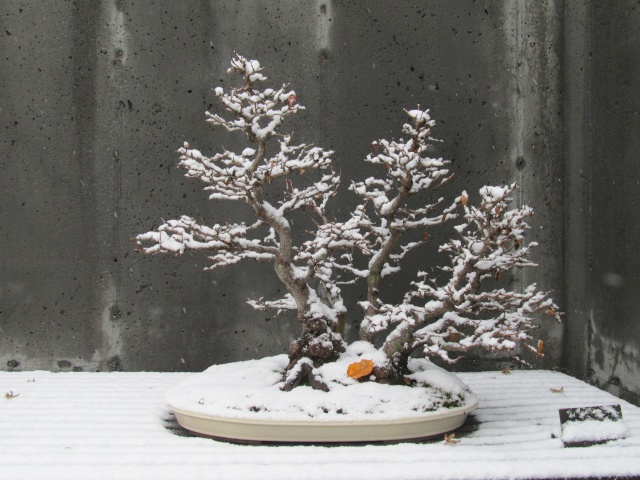
Amurs are coarser than tridents, in my view, and more like red maple (Acer rubrum) in the way they work as bonsai. In the landscape they are spreading shrubs or small trees, and they produce brilliant autumn color ranging from yellow to orange to red. Here is an image taken last autumn:

This planting was one I put together back in the early 2000's, using a cutback nursery plant for the main tree and 4 smaller trees produced from cuttings.
Last year in January I did some work on this specimen to lower the apexes on all of the trees. They had over time grown pointy headed, which is something that can happen with bonsai when you are not paying attention. Here is the before picture:

And here it is after the corrective work:

Here is a closeup of the #2 tree's apex before:

And here it is after:

One problem with having this plant out all winter is that I can lose track of what it is doing, as I spend more of my winter work time in the shop and not out in the garden. Then, one day I go to the garden and find the amur group planting in leaf, past the point where it should properly be repotted. That happened last spring, and as a result the root mass in the pot became so dense it was hard to get water in it. So I had to make certain I did not miss it again this year.
Because of that compacted root ball, combined with the reality that I am getting older and no longer have the strength and energy I once did (or, to put it in a better light, because I am getting older and learning how to do things in smarter ways), I decided to use a reciprocating saw to help with the work. This picture shows the job underway, with pieces of the root mass already cut off and laying on the floor:

One of those chunks removed with the saw:
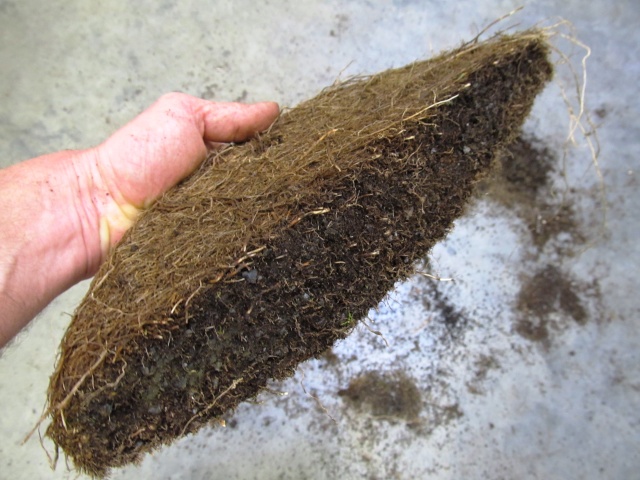
After whittling down the root mass by removing pieces from the side, I then sliced off the bottom half:

Here you can see how densely the roots were packed in the bottom of the pot:
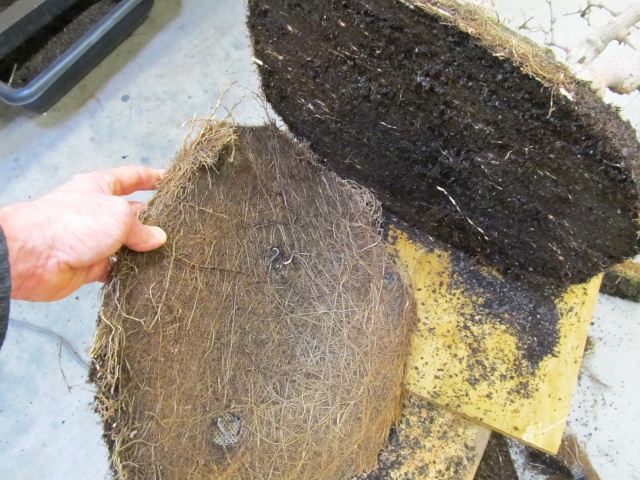
That work done with the saw took about 5 minutes. If I had done it all by hand, as I used to, it would have taken at least half an hour and killed my hand.
Next I flipped the group on its side and worked the bottom of the mass with a 2-pronged root rake, loosening it up:
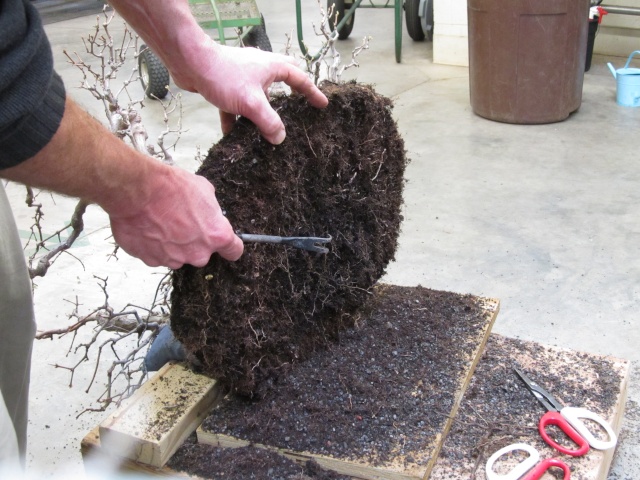
As a solo act, I have had to learn over time how to do 2-person jobs by myself. A piece of 2X4, a bean bag and a wedge allowed me to lay the bonsai over on its side so I could work the bottom of the root mass. Once the bottom had been loosened, I cut it some more by hand, with scissors:
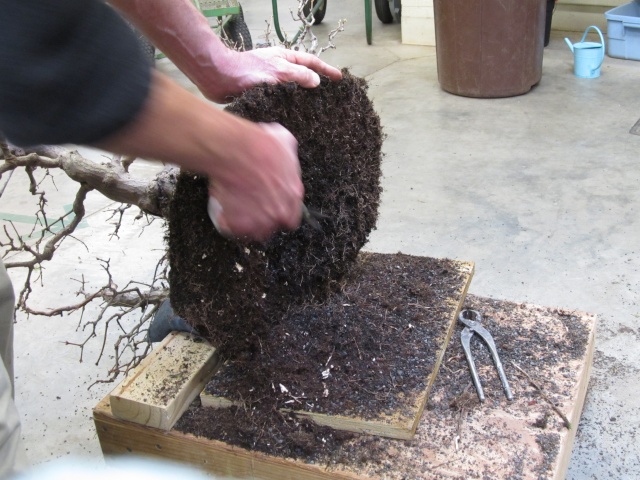
Here we see the completed work on the bottom, with the light colored spots being heavier roots that were cut:

Next, flipping the plant right side up, I worked the top side with the root rake:

Then trimmed off the loosened stuff:

This hand work with scissors is necessary. The reciprocating saw saves labor, but the cutting it does to the roots leaves a ragged finish. Roots, like branches, will respond better to pruning if they are cut cleanly and not left ragged.
Here is the resulting root mass, reduced from the sides, from the bottom, and finally from the top:

I then cut a few wedges into the mass:

This is done in order to refresh the old medium in the interior of the mass. Each time a bonsai is repotted some of these wedges are removed, with the wedges being cut in different locations each time so that over the course of years the entire core of the root mass is refreshed.
The container for this plant is a long oval, 25in (63.5cm) across lengthwise, and 15in (38.1cm) front to back, interior dimensions:

I think the white glaze color is helpful for this specimen in the summer, reducing some of the heat buildup in the root zone for a plant that does better in colder than warmer climates. The container was donated to us some years back. It is of Japanese manufacture and is signed on the bottom:

(I might not have that signature correctly oriented in the photo, due to my not having any familiarity with Japanese characters; if so, I apologize.)
Here we see the plant situated in the container, on a thin layer of medium:

After wiring the root mass in place and filling in with medium:
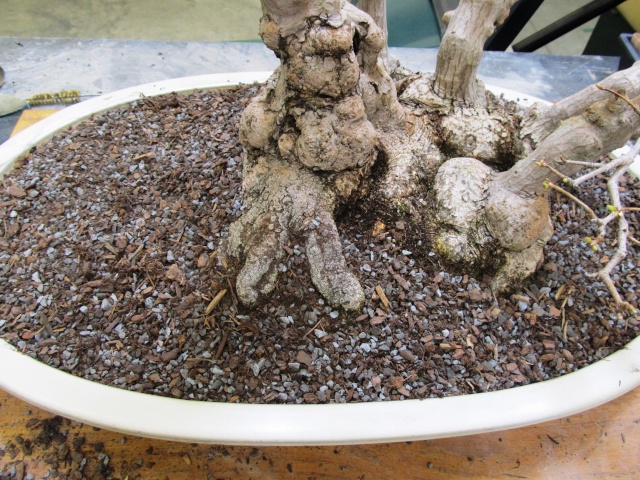
What follows is a sequence of pictures showing a 360-degree view of the newly repotted amur maple group planting. The final image is the primary view:
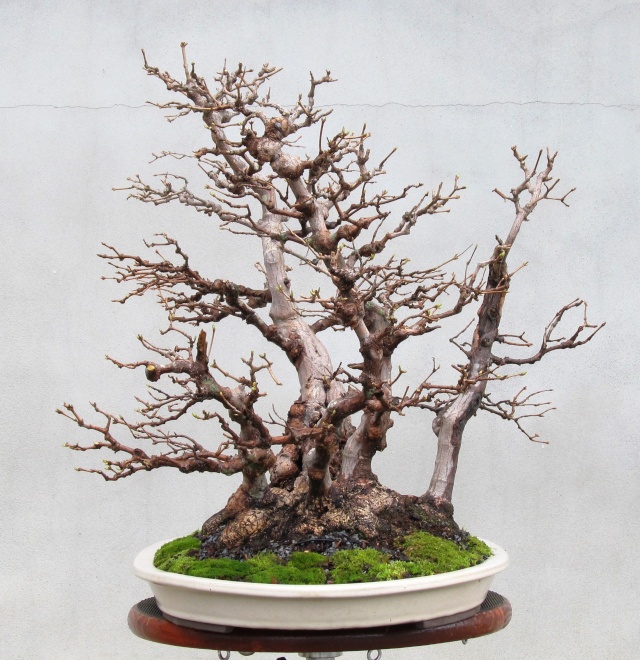
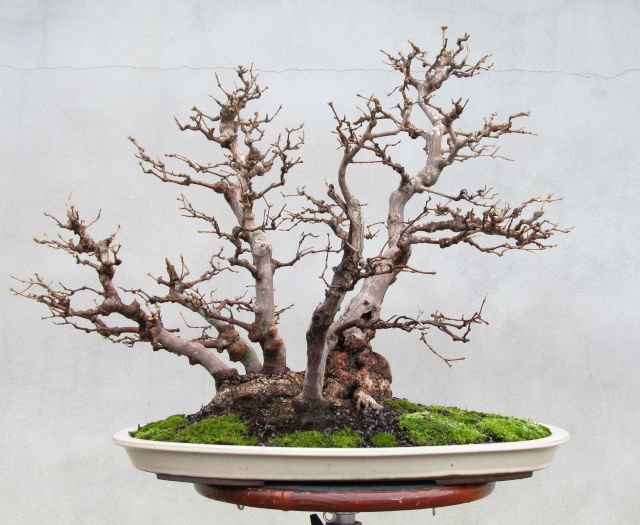


This work was done not a moment too soon!
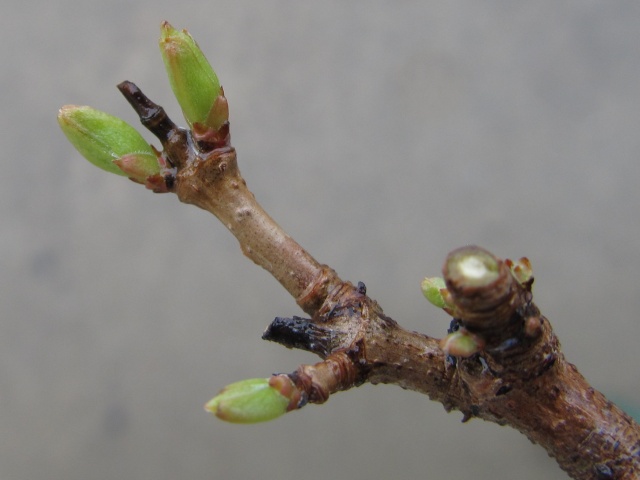
A funny thing happened this week - I went to transplant the tree from the last post into its new Sara Rayner container and came to find that the pot is too small. Now, that pot is 17in (43.1cm) in diameter, interior dimension, but it lacked about 2in (5cm) for me to even wedge the maple in it. The ghost of Roy Scheider was looking over my shoulder saying "You're gonna need a bigger pot!". So, the maple was root pruned and put back in the grow box for another year.
Today's post features a different maple species - Acer ginnala. Amur maple is native to northeastern Asia so it is extremely cold-hardy. In the US amur maples tend to be favored by people who live in colder regions, where tridents do not fare so well. Here in western North Carolina amur maple is one of the species I feel comfortable leaving out, fully exposed, all winter. Here is an image of the one amur maple bonsai in the NC Arboretum collection, a group planting, enjoying a bit of weather that must harken it's genetic memory back to the days in the old country:

Amurs are coarser than tridents, in my view, and more like red maple (Acer rubrum) in the way they work as bonsai. In the landscape they are spreading shrubs or small trees, and they produce brilliant autumn color ranging from yellow to orange to red. Here is an image taken last autumn:

This planting was one I put together back in the early 2000's, using a cutback nursery plant for the main tree and 4 smaller trees produced from cuttings.
Last year in January I did some work on this specimen to lower the apexes on all of the trees. They had over time grown pointy headed, which is something that can happen with bonsai when you are not paying attention. Here is the before picture:

And here it is after the corrective work:

Here is a closeup of the #2 tree's apex before:

And here it is after:

One problem with having this plant out all winter is that I can lose track of what it is doing, as I spend more of my winter work time in the shop and not out in the garden. Then, one day I go to the garden and find the amur group planting in leaf, past the point where it should properly be repotted. That happened last spring, and as a result the root mass in the pot became so dense it was hard to get water in it. So I had to make certain I did not miss it again this year.
Because of that compacted root ball, combined with the reality that I am getting older and no longer have the strength and energy I once did (or, to put it in a better light, because I am getting older and learning how to do things in smarter ways), I decided to use a reciprocating saw to help with the work. This picture shows the job underway, with pieces of the root mass already cut off and laying on the floor:

One of those chunks removed with the saw:

After whittling down the root mass by removing pieces from the side, I then sliced off the bottom half:

Here you can see how densely the roots were packed in the bottom of the pot:

That work done with the saw took about 5 minutes. If I had done it all by hand, as I used to, it would have taken at least half an hour and killed my hand.
Next I flipped the group on its side and worked the bottom of the mass with a 2-pronged root rake, loosening it up:

As a solo act, I have had to learn over time how to do 2-person jobs by myself. A piece of 2X4, a bean bag and a wedge allowed me to lay the bonsai over on its side so I could work the bottom of the root mass. Once the bottom had been loosened, I cut it some more by hand, with scissors:

Here we see the completed work on the bottom, with the light colored spots being heavier roots that were cut:

Next, flipping the plant right side up, I worked the top side with the root rake:

Then trimmed off the loosened stuff:

This hand work with scissors is necessary. The reciprocating saw saves labor, but the cutting it does to the roots leaves a ragged finish. Roots, like branches, will respond better to pruning if they are cut cleanly and not left ragged.
Here is the resulting root mass, reduced from the sides, from the bottom, and finally from the top:

I then cut a few wedges into the mass:

This is done in order to refresh the old medium in the interior of the mass. Each time a bonsai is repotted some of these wedges are removed, with the wedges being cut in different locations each time so that over the course of years the entire core of the root mass is refreshed.
The container for this plant is a long oval, 25in (63.5cm) across lengthwise, and 15in (38.1cm) front to back, interior dimensions:

I think the white glaze color is helpful for this specimen in the summer, reducing some of the heat buildup in the root zone for a plant that does better in colder than warmer climates. The container was donated to us some years back. It is of Japanese manufacture and is signed on the bottom:

(I might not have that signature correctly oriented in the photo, due to my not having any familiarity with Japanese characters; if so, I apologize.)
Here we see the plant situated in the container, on a thin layer of medium:

After wiring the root mass in place and filling in with medium:

What follows is a sequence of pictures showing a 360-degree view of the newly repotted amur maple group planting. The final image is the primary view:




This work was done not a moment too soon!


Arthur Joura- Member
 Re: American Bonsai at the NC Arboretum
Re: American Bonsai at the NC Arboretum
Arthur,
Nice post. I too like this maple and have several of them and I agree they are a bit courser than the tridents. The leaves don't quite reduce as well, or maybe it is just me....LOL. But like tridents they will run away on you in a hurry if you are not vigilant with them. Do you have any special techniques for building ramification with this species?
Yes, reciprocating saws are wonderful. I use them when I go collecting.
Steve
P.S. Like the movie reference.
Nice post. I too like this maple and have several of them and I agree they are a bit courser than the tridents. The leaves don't quite reduce as well, or maybe it is just me....LOL. But like tridents they will run away on you in a hurry if you are not vigilant with them. Do you have any special techniques for building ramification with this species?
Yes, reciprocating saws are wonderful. I use them when I go collecting.
Steve
P.S. Like the movie reference.

Stephen Krall- Member
 Re: American Bonsai at the NC Arboretum
Re: American Bonsai at the NC Arboretum
very nice AJ and as always, very informative... and where the heck was the young buck, Joshua when you really need him ? 
at our last Arbor Arts Collective (MKE) session a week ago, one of our guys (that S.O.B. Steve ) re-potted a large maple forest and it was quite the project... i was glad to be present when he did as he has been doing bonsai for 20+ years and it was a text book operation, just as this one was...
) re-potted a large maple forest and it was quite the project... i was glad to be present when he did as he has been doing bonsai for 20+ years and it was a text book operation, just as this one was...
i documented it and will post that project on his behalf one of these days.
thanks again for giving us a peek behind the scenes.
at our last Arbor Arts Collective (MKE) session a week ago, one of our guys (that S.O.B. Steve
i documented it and will post that project on his behalf one of these days.
thanks again for giving us a peek behind the scenes.

Kevin S - Wisco Bonsai- Member
 Re: American Bonsai at the NC Arboretum
Re: American Bonsai at the NC Arboretum
Thanks Arthur for another great and instructional posting. Still think these belong in a book. $ for the Arboretum. Your along way from being 'aged'. However, wisdom does not come from age it comes from experiences and the seeking of experiences. I am appreciative of your sharing yours. OH and a framed picture of this tree belongs on a wall. One could loose oneself in visions of being under these trees in another world.
Thanks and hope you get to thaw out soon. Was 70f here but now back to 40f.
Thanks and hope you get to thaw out soon. Was 70f here but now back to 40f.

DougB- Member
 Re: American Bonsai at the NC Arboretum
Re: American Bonsai at the NC Arboretum
This one is gorgeous in my eyes. I feel the tree much more now that it is sitting up higher in the pot. The feeling of a clump on a hillock is genuine.
JudyB- Member
 Re: American Bonsai at the NC Arboretum
Re: American Bonsai at the NC Arboretum
Thanks for this post. I have an 3 year old Amur maple seedling and love that I can leave it outside in zone 5b, merely by moving it to the shade, under a bench for the winter. This species needs to be used more.

Leo Schordje- Member
 Re: American Bonsai at the NC Arboretum
Re: American Bonsai at the NC Arboretum
There was a very nice turnout at PSBA for Arthur's presentation in Seattle Monday. Not needed the "mic", his voice and concepts of "americn Bonsai" were well received by the gathered. If your club ever has the opportunity to have him as a speaker, I certainly encourage you to do so. 

dick benbow- Member
 Re: American Bonsai at the NC Arboretum
Re: American Bonsai at the NC Arboretum
Hiya Arthur,
Just spent a little time getting caught up on your thread (I'm not online as often as one my age is often assumed to be). Just wanted to say that your posts continue to be informative, pretty, and very well written. Maybe you should write a book some day?
Just spent a little time getting caught up on your thread (I'm not online as often as one my age is often assumed to be). Just wanted to say that your posts continue to be informative, pretty, and very well written. Maybe you should write a book some day?

Chellis- Member
Page 16 of 40 •  1 ... 9 ... 15, 16, 17 ... 28 ... 40
1 ... 9 ... 15, 16, 17 ... 28 ... 40 
 Similar topics
Similar topics» American Bonsai at the NC Arboretum
» WISTERIA BONSAI AT INTERNATIONAL BONSAI ARBORETUM
» Ashville arboretum bonsai
» Show the Autumncolour from your bonsai
» Trip to the Rochester Arboretum
» WISTERIA BONSAI AT INTERNATIONAL BONSAI ARBORETUM
» Ashville arboretum bonsai
» Show the Autumncolour from your bonsai
» Trip to the Rochester Arboretum
Page 16 of 40
Permissions in this forum:
You cannot reply to topics in this forum






